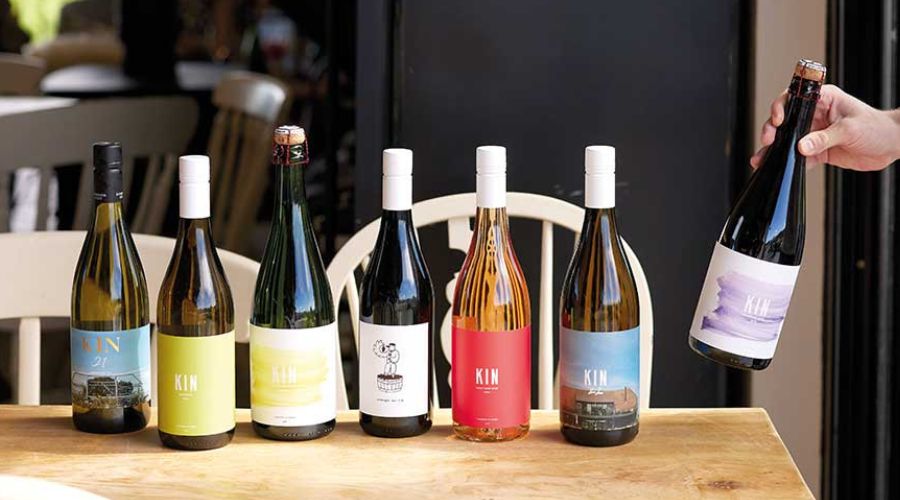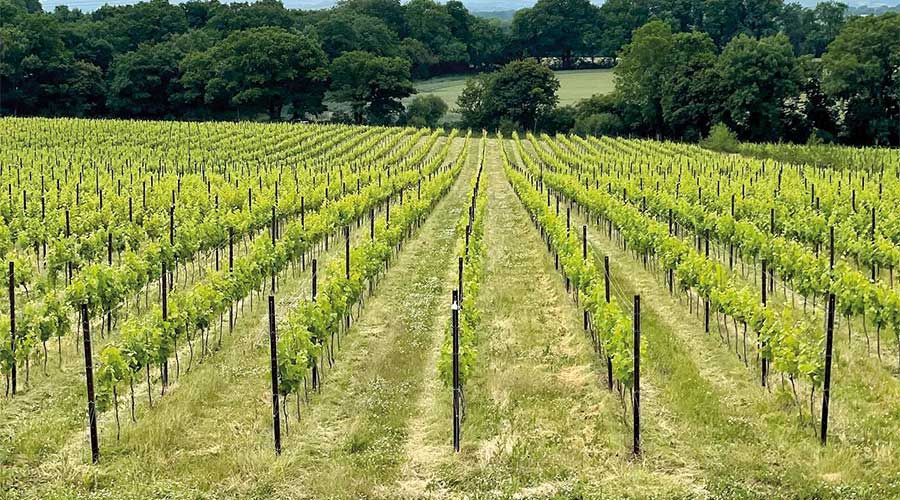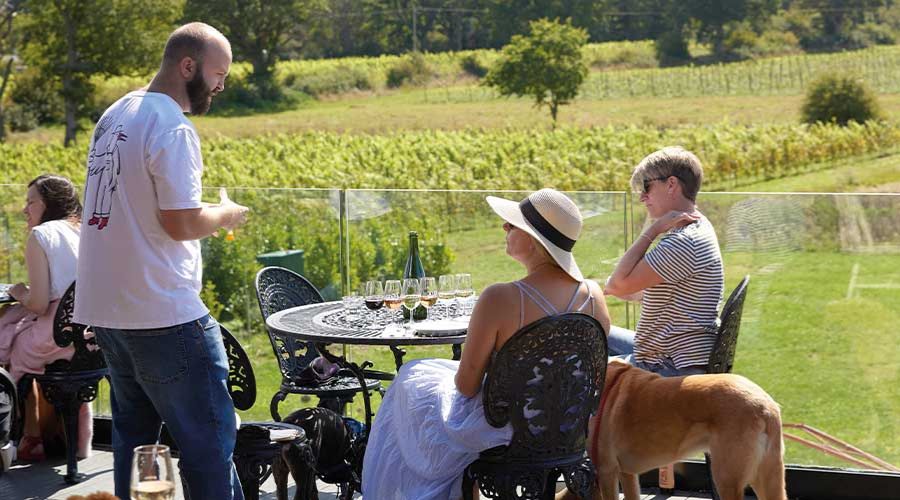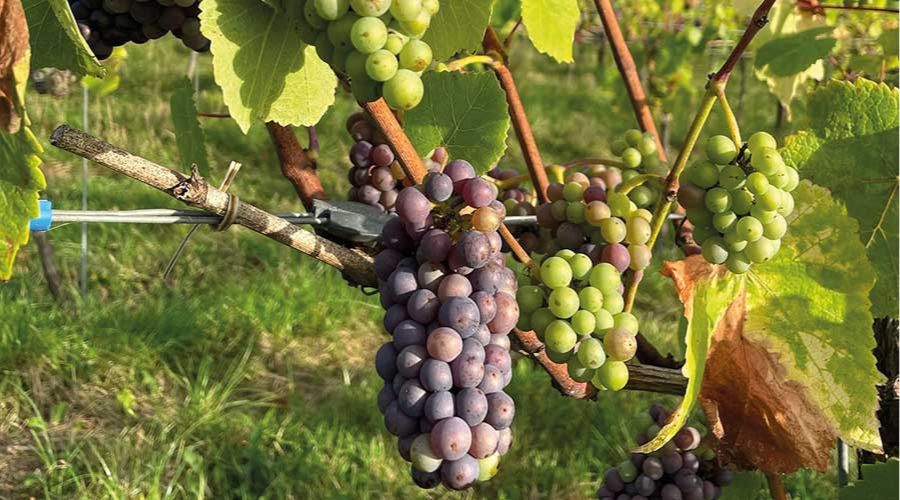Built on a foundation of enthusiasm, energy and hard work
14th April 2025
Kinsbrook is a progressive vineyard in the heart of West Sussex, run by owner and managing director Joe Beckett and his partner and marketing director, Rebecca Dancer.

After graduating from university, Joe travelled in New Zealand where he was inspired by the vibrant wine scene. Mostly self-taught in the world of viticulture, Joe Beckett then set about creating a 10-year plan for his own vineyard in the UK, with the first vines being planted in 2017 on the family’s third-generation farmland.
Joe explains: “We now have three vineyard sites within a five-mile radius of each other. The first site was planted with 20,000 vines in 2017. We call it ‘The Orchard Site’ because the field used to be an orchard growing apples and pears for cider making.
“Our largest site, ‘Picketty’ which also serves as our public site, was planted with vines in 2018, 2019 and 2022, and previous to this was rented out to arable farmers for winter wheat production, flax for linen clothing and corn for animal feed. The site itself was part of a mushroom farm until the 1980s when my grandfather purchased the land.”
Kinsbrook has over 10 varieties in differing proportions planted across the three sites. The largest planting is Chardonnay, followed by Pinot Noir and Pinot Meunier, but they also grow a wide range of still grape varieties including Bacchus, Pinot Gris, Ortega and Pinot Noir Précoce.
Meeting challenges head on

The soil posed an issue, as the heavy clay is prone to waterlogging which, Joe explains, isn’t ideal for vines. “We introduced land drains to all our vineyard sites, as we couldn’t risk the vines becoming waterlogged being on such heavy clay. This has dramatically improved the land drainage and it’s not an issue for us at all anymore.”
Aside from the obvious challenges which all farmers and viticulturalists will understand in relation to weather patterns, disease and pest pressures and changing yields as a result, the industry faces enormous challenges due to being a ‘young’ or ‘new’ agricultural sector.
One issue which Joe highlighted in particular is that there is a minimal second-hand market for equipment, which makes essential purchases such as tractors or kitting out a winery very costly; often these items must be bought brand new.
“On top of this, the tax costs are rising year-on-year, so it’s more expensive than ever to produce a bottle of wine in the UK, whereas in some other European countries there is no duty so it’s a more supportive climate for growers and producers,” he adds.
The vineyard is lucky to have specialist dealers fairly locally, though, which helps when it comes to sourcing some equipment. “David Sayell from Vitifruit has supplied us with several pieces of equipment, from our manure spreader to our fungicide sprayer,” says Joe. “We also own two New Holland tractors purchased from Haynes and we find this is enough for our current operation and contract services for others.”
Disease and pest control
Joe explains that 2024 was one of the hardest growing seasons on record. “Although we managed to avoid frost damage in the spring, it was followed by one of the darkest, wettest, coolest summers for many years. It was very diffcult to ripen the fruit in time for harvest and there was constant disease pressure looming.
“Fortunately, we have a brilliant vineyard manager called Blago Dishkov, and together we kept these issues at bay and ended up with healthy, ripe, disease-free fruit at harvest (although the yields were still lower than we would have liked).
“My biggest concern is spotted wing drosophila (SWD) as it’s so hard to prevent. Other pests such as birds, deer and even wasps are easier to treat with various preventative methods such as fencing and netting, but how do you keep out a tiny insect that wreaks so much havoc with your fruit?
“We follow sustainable practices as far as we possibly can, and we certainly don’t want to spray insecticide. Although there are some new technologies being developed, SWD is a big worry for me at the moment.”
Kinsbrook uses vertical shoot positioning (VSP) trellising which Joe explains is a standard system, but that he also uses because it’s the best option for disease prevention and maximising sunlight in cool-climate growing.
Looking after the vines
Joe says Kinsbrook’s aim is to continue to prioritise their vine health and productivity so that they can improve their bottle production numbers each year.
“This will allow us to expand into new markets in the trade and perhaps even look at exporting one day!
“We follow a technique called ‘gentle pruning’ which is designed to work with the natural flow of the nutrients in the vine itself. We start pruning in November and finish in March.
Canopy management in the summer months is all designed to reduce humidity and maximise sunlight reaching the canopy. We do a lot of leaf removal and shoot selection to make sure that we have a balanced yield and there isn’t anything growing on the vine that we don’t want.
Bud burst tends to be earlier each year as a result of slightly warmer temperatures in spring due to climate change.
“We usually experience bud burst in mid-April with the first varieties being some of our older Germanic varieties such as Dornfelder and Ortega and the last variety being Chardonnay.
“Véraison usually takes place in August/September and we harvest the Pinot Noir Précoce first each year, followed by our Bacchus and Pinot Meunier all the way through to our Chardonnay, which always seems to be harvested last at Kinsbrook.
“All of our grapes are hand harvested by our own in-house team, public volunteers and friends and family. Because we’re a relatively new vineyard, our fruit yield is increasing each year as more vines are maturing. On average, we currently produce 2-4 tonnes per acre each year.”
Welcoming visitors

Joe and Rebecca initially opened the vineyard to the public during the 2020 pandemic, converting a horsebox into a coffee trailer and serving drinks alongside cakes which were homemade in Joe’s parents’ kitchen. That same year also saw the release of their first wines – a classic sparkling, a Bacchus and a Pinot Gris.
The coffee trailer was a huge hit, so Joe then opened up the space even further, allowing people to walk their dogs at the vineyard. Spurred on by this initial success, Joe and Rebecca then built a polytunnel to be used as a café and a cellar door for their wines.
For Joe and Rebecca, this little-by-little approach has meant they can expand the business as and when they can afford it, and they can assess the response and viability of each stage without too much risk.
The next step was a big one, however – the building of Kinsbrook’s Farmhouse, which now acts as the vineyard’s cellar door and visitor centre, housing a restaurant, deli and shop.
“We run tours and tastings which are hugely popular; they’ve really boomed over the years,” comments Joe. “We also run ticketed events throughout the year including Supper Club-style feasts, kitchen takeovers, floristry workshops, a rustic summer festival and a harvest party.
“We’re available for private hire so we do also have a busy calendar with private events throughout the year from corporate dos to christenings, wakes and weddings.
“We sell about 90% of our wine from our own Kinsbrook runs tours and tastings, which are proving very popular with visitors Kinsbrook produces a full range of sparkling and still wines, including white, rosé and red. A fairly recent addition, Kinsbrook’s Farmhouse houses a restaurant, deli and shop cellar door.
“We have a restaurant onsite and a shop and we’re open to the public seven days a week, so we’re kept very busy! We do also supply a small number of trade customers, both on and off trade. I run Kinsbrook side by side with my partner Rebecca, and she heads up all our marketing and creative efforts, looking after our social media, website, SEO, marketing and sales, graphic design, label creation and more.”
Following on from their own success and learnings, the Kinsbrook team have also recently started offering their services to other vineyards around them, and they now have a small number of clients who use their consultancy services to help with establishing, growing and improving their vineyards.
Across the whole business, Kinsbrook has around 25 employees who manage the running of Kinsbrook Farmhouse each day in the hospitality and retail sectors. There are four full-time vineyard members, including vineyard manager, Blago.
The vineyard also offers experience to viticulture students. “We’re proud supporters of the vineyard apprenticeship programmes at Plumpton College and we’ve had several apprentices from Plumpton through the years,” explains Joe.

Next step for winemaking Kinsbrook produces a full range of sparkling and still wines including white, rosé and red.
“Since we started producing wines, we’ve been using contract winemaking facilities at Stopham for our still wines and Wiston for our sparkling, with the sparkling produced using the traditional method,” explains Joe.
“We chose them for several reasons; the proximity to our vineyard sites was important to us so we could regularly stop by the winery to be as actively involved in the winemaking processes as possible, and we also picked them based on both wineries having great reputations within the industry.”
Kinsbrook’s aim has always been to bring all winemaking in-house, but as Joe already pointed out, it’s extremely costly to kit out a full winery in the UK. “We built the shell for our onsite winery building back in 2020, but we’ve been unable to afford equipment for it until now. We’re currently in the process of setting the winery up and it will be ready for harvest this year, which we’re hugely excited about.”
Grower Profile

Kinsbrook vineyard – view site.
Location: Thakeham, West Sussex
Total vineyard size: 11ha under vine
Soil type: Heavy clay
Aspect: An in-land, low, south-facing, windy site
Varieties grown: Chardonnay, Pinot Noir, Pinot Meunier, Bacchus, Pinot Gris, Dornfelder, Ortega and Pinot Noir Précoce
